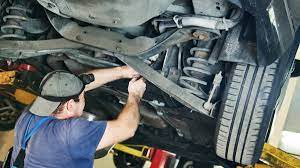The cost depends on several factors—most notably, the kind of car you drive. It’s logical that a Ford would have a different suspension from a Mercedes (which is normally more expensive). Additionally, the extent of the damage matters: if it’s only one part that needs to be fixed or replaced, you’re probably looking at under $1,000. However, if more than one part has been done in by a pothole or other hazard on the road, that price can easily surge to over $3,500.
The average range for fixing a damaged suspension is between $500 and $3,500. This broad range shows us how dependent your final bill will be on your particular circumstance: Make and model of vehicle? How extensive was the damage to the suspension? Who is repairing it? These are all questions you should ask and answer before handing over any money.
How much does it cost to replace a car suspension?
For many people, the suspension’s probably the most important part of their car. But is it really? I mean, you could have a car that sits on four wheels but has no engine, no transmission and no brakes—wouldn’t it still be an absolutely terrible form of transportation? (Obviously not.)
This was the point I decided to start this essay. I’m not saying replacing your car suspension is worth doing unless you’re in a real bad situation—but let’s consider just how much your suspension costs when you need to repair or replace it. In other words: How much does it cost to fix/replace your car suspension?
How to save money when fixing car suspension?
There are various ways to save money when fixing car suspension. Some of the most effective ways of saving on the cost of fixing car suspension include:
- Replacing worn out parts before they wear out fully
- Buying cheaper spare parts
- Buying used spare parts
- Buying spare parts online
- Doing it yourself
- Understanding your insurance policy
Taking care of car suspension.
While your car suspension isn’t something that needs to be replaced every few months, it is something you will have to keep in mind when long-term planning for maintaining your vehicle. Between oil changes, tire rotations, and regular visits to the mechanic for inspections, consider adding car suspension checks to your maintenance checklist.
Inspecting and fixing the car suspension system on a schedule will help prevent potential problems before they occur—and it can save you money in the long run by keeping more extensive repairs at bay. If your car has a worn-out suspension system due to neglect or just sheer mileage, an inspection can alert you of any loose or worn out parts before they break down completely and lead to an expensive repair bill.


